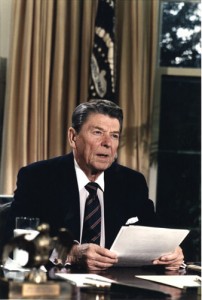I’m a historian, so I have the developed habit of looking back as I contemplate the future. I look back for instances when leaders stood on principle and hope we will have such leaders as we go forward as a nation. Many of us are rightly distressed over the current state of affairs, but I would like to offer a few words of encouragement.
 When Ronald Reagan took office in January 1981, the country was a mess economically, militarily, and in foreign affairs. The task before him seemed, to many, impossible to manage. Yet it was not. In his farewell address to the nation in 1989, Reagan surveyed his eight years in office and had some profound thoughts to share. I’d like to remind us of what he said at that time. The following are excerpts from that address. Take them to heart.
When Ronald Reagan took office in January 1981, the country was a mess economically, militarily, and in foreign affairs. The task before him seemed, to many, impossible to manage. Yet it was not. In his farewell address to the nation in 1989, Reagan surveyed his eight years in office and had some profound thoughts to share. I’d like to remind us of what he said at that time. The following are excerpts from that address. Take them to heart.
Well, back in 1980, when I was running for President, it was all so different. Some pundits said our programs would result in catastrophe. Our views on foreign affairs would cause war. Our plans for the economy would cause inflation to soar and bring about economic collapse. I even remember one highly respected economist saying, back in 1982, that “The engines of economic growth have shut down here, and they’re likely to stay that way for years to come.” Well, he and the other opinion leaders were wrong. The fact is, what they called “radical” was really “right.” What they called “dangerous” was just “desperately needed.”
 And in all of that time I won a nickname, “The Great Communicator.” But I never thought it was my style or the words I used that made a difference: it was the content. I wasn’t a great communicator, but I communicated great things, and they didn’t spring full bloom from my brow, they came from the heart of a great nation — from our experience, our wisdom, and our belief in the principles that have guided us for two centuries. They called it the Reagan revolution. Well, I’ll accept that, but for me it always seemed more like the great rediscovery, a rediscovery of our values and our common sense. …
Ours was the first revolution in the history of mankind that truly reversed the course of government, and with three little words: “We the People.” “We the People” tell the government what to do; it doesn’t tell us. “We the People” are the driver; the government is the car. And we decide where it should go, and by what route, and how fast. Almost all the world’s constitutions are documents in which governments tell the people what their privileges are. Our Constitution is a document in which “We the People” tell the government what it is allowed to do. “We the People” are free. This belief has been the underlying basis for everything I’ve tried to do these past 8 years. …
Finally, there is a great tradition of warnings in Presidential farewells, and I’ve got one that’s been on my mind for some time. But oddly enough it starts with one of the things I’m proudest of in the past 8 years: the resurgence of national pride that I called the new patriotism. This national feeling is good, but it won’t count for much, and it won’t last unless it’s grounded in thoughtfulness and knowledge.
 An informed patriotism is what we want. And are we doing a good enough job teaching our children what America is and what she represents in the long history of the world?
There are some inspiring words in that address: the “great rediscovery” and the paragraph about the limits of government stand out. I also like the warning at the end. Patriotism is not a feeling; it is a thoughtful and knowledgeable commitment. Are we informed patriots or just angry citizens? There is a difference. And what do our children know about the real history of America? What are we doing to ensure they have a balanced perspective?
We are not yet doomed. God can raise up leaders who will put principle over pragmatism. We need to pray for them and support them in every way we can.
